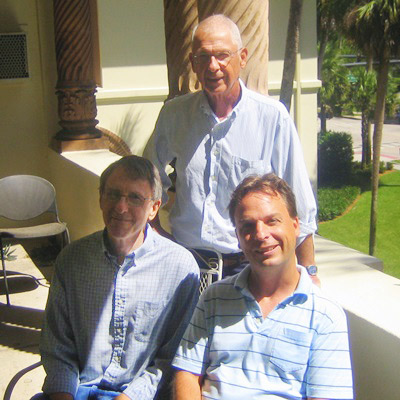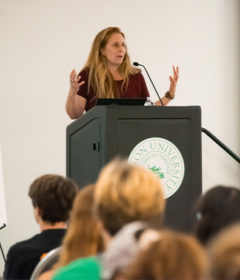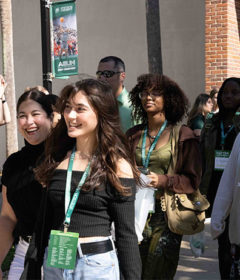A Legacy in the Psychology Department
 In Stetson University’s Psychology Department, a legacy of three generations has been developing since the 1970s, when Dwaine Cochran, Ph.D., taught Richard Medlin in his psychology class. Cochran, proud and pensive, with research interests that include personal space, health attitudes, gerontology, optimism and anthropomorphism, expounds about his colleague: “Medlin was a great student, and one among many academics in his family that attended this campus.” (Pictured, l to r: psychology professors Richard Medlin; Dwaine Cochran, standing; Chris Ferguson.)
In Stetson University’s Psychology Department, a legacy of three generations has been developing since the 1970s, when Dwaine Cochran, Ph.D., taught Richard Medlin in his psychology class. Cochran, proud and pensive, with research interests that include personal space, health attitudes, gerontology, optimism and anthropomorphism, expounds about his colleague: “Medlin was a great student, and one among many academics in his family that attended this campus.” (Pictured, l to r: psychology professors Richard Medlin; Dwaine Cochran, standing; Chris Ferguson.)
As an undecided major, Medlin ended up falling for what he dubs the “coolest” major: psychology. After graduating from Stetson in 1975, Medlin then earned the Ph.D. in developmental psychology from the University of North Carolina at Chapel Hill. He returned to his alma mater in 1981, and has been teaching in the same psychology department that had inspired him so much, years before when he was a young college student.
“There were so many ties, so many good memories,” Medlin said. “My high school sweetheart and I got married while we were students at Stetson. Coming back to Stetson was coming home again.”
At that time, a legacy of two generations, Cochran and Medlin both had the young, enthusiastic student, Chris Ferguson, in their Stetson classes.
In 1993, Ferguson graduated from Stetson with a degree in psychology. “As a student, I always thought how cool it would be to return to Stetson,” he explained. “I had an amazing experience learning under such wonderful professors and enjoying the social atmosphere.”
And, this fall, Ferguson, Ph.D., did just what he had thought about doing. Having the opportunity to come back to Stetson was “a once in a lifetime opportunity,” he said. “There was no question, I had to take it.”
For Ferguson, like Medlin, returning to Stetson was as if he were “coming home.” Ferguson, a leading expert in examining the effects of media on behavior, such as video game violence, is now the chair of Stetson’s Psychology Department.
“It’s really amazing to think about; it speaks to the community of Stetson,” Ferguson said with enthusiasm. “It really says something to have two generations of students return to Stetson to teach.”
And it seems there is potential, Ferguson explained, for the streak to continue. “One of the students in my social psychology class mentioned her interest in being a professor,” he said. “If she came back to Stetson, we’d then have four generations, which would be just unfathomable!”
By George Salis



